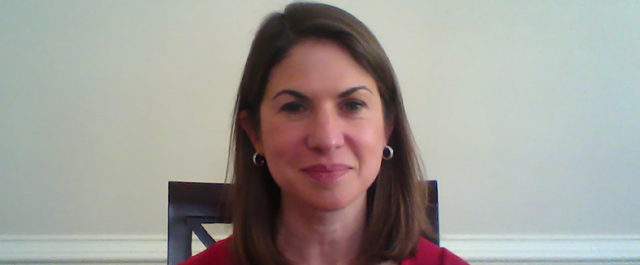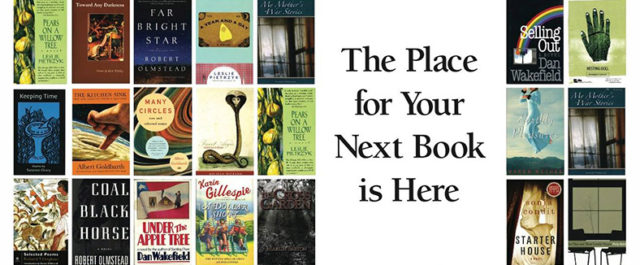Interview by Katie Sherman
Not every agent has a tradition track to literature. Marcy Posner, for instance, gained an appreciation for the written word during her time as a librarian. From there, she went to work for Pinnacle books (“I was given a book to edit the third week of my employment!”). She’s worked for Rodale Press and Salem House. As Pantheon’s Associate Publisher, she had the honor of working with a number of cultural icons including Noam Chomsky, Studs Terkel, Matt Groening, and Art Spiegelman. After fifteen years on the editorial side of the business, she transitioned to agenting where she spent “twelve years at the William Morris Agency as an agent and as Vice President and Director of Foreign Rights; five years as president of my own agency; five years at Sterling Lord Literistic as an agent and Director of Foreign Rights; and I’m now at Folio – and very happy,” Posner says.
We sat down with Posner to pick her brain on the trends she’s loving (and hating!), her biggest literary influences, and how self-publishing can negatively effect your writing career.
S85: What advice would you give aspiring authors submitting work to agencies, editors, and publishing houses for the first time?
MP: Do your homework! Find the right agent for your work. Go to books that you think are similar to yours, look at the acknowledgments, and find the agent. Query them and reference that book you love. This is a job for the agent, and this is a job for you.
S85: Why do writers need (or do they need) an agent? An editor? What are the benefits and pitfalls?
MP: Writers need an agent because they are the foot in the door to the publishing industry. For my clients, I am able to bring to bear all the institutional memory I possess, knowing which editors and which publishing houses have a penchant for a certain subject, or a different voice, or a particular kind of author. You need an editor because no one can edit their own work. You need the eye of another person who is skilled at the craft. Also, once the book is published, you need a champion in house and your editor is that. I don’t think there are any pitfalls if you find the right agent for you. Never pay a reading fee.
S85: What advice do you have for writers regarding their cover letter? Their elevator pitch? Their manuscript?
MP: The elevator pitch is very important for a query letter. It should be the first paragraph. Don’t submit or talk about more than one manuscript in a query. I have found that the manuscripts of writers who submit several at a time are not good because they lack focus.
S85: What is one of the biggest mistakes you’ve seen a writer make after they were signed to an agency/publishing house?
MP: Not listening to their agent or editor. Thinking they know the process better than the experts do. Don’t go rogue.
S85: In the increasingly growing electronic world, self-publishing is becoming more and more prevalent. Is this hurting the mainstream publishing industry? Why or why not?
MP: Self-publishing can actually hurt the author. When I pitch a self-published author to a mainstream publishing house, the editor will look up the author and see the self-published material. If the book didn’t sell tens of thousands of copies, most likely the editor will not be interested in acquiring further work from this author. In fact, self-publishing numbers have gone down lately because “free” books that are bad do not help the author. You need those gate keepers – the agent and the editor.
S85: What characteristic do you look for first in a first-time author you’re going to work with? In an author who you want to work with throughout their career?
MP: A good sense of humor. You have to take everything with a grain of salt and be able to laugh things off. This business can at times be not fun and you have to get past that.
S85: What trends do you currently see in literature that you love? What trends do you currently see in literature that you hate?
MP: I like that even literary novels have plots these days so that you can get great writing and a great story at the same time.
I’m a social progressive, but I think that there are just too many books about the major social issues of today that are saturating the market and rendering the power of the author’s voice ineffective.
S85: What was the first poem, book, or short story collection that made you passionate about what you do?
MP: A Wrinkle in Time. I started out as a children’s librarian, and I was passionate about this book. It led me to want to work with writers to produce books of the same caliber.
S85: What recent book/collection made you laugh? Made you cry?
MP: Who Gives a Hoot? by Jacqueline Kelley, an early reader that I represent, made me laugh. A middle grade novel that I represent that will be published by Candlewick in Fall 2018, Speechless by Adam Schmitt, made me cry. (As you can see, I don’t get to read much past my clients.)
Thank you, Marcy!
At the moment Marcy Posner is looking for, “commercial women’s fiction, historical fiction, mystery, biography, history, health, and lifestyle – and, especially, thoughtfully written commercial novels, thrillers with international settings, and narrative non-fiction. In young adult, I’m looking for smart, contemporary novels and historical fiction.”
About the Agent
 Marcy Posner’s editorial skill and a deep knowledge of the publishing industry sets her apart from many of her colleagues. When she work with authors, she focuses editorially on how to make the book as strong as it could be – whether that book be terrific women’s fiction or an extraordinary YA debut (or any of the other categories she represents). During that process, she is able to bring to bear all the institutional memory she possesses, knowing which editors and which publishing houses have a penchant for a certain subject, or a different voice, or a particular kind of author. Her clients include Newbery Honor winner and New York Times bestseller Jacqueline Kelly, New York Times bestseller Sheri Reynolds, autism advocate Christina Adams, Kristi Cook, Christopher Grant, Gretchen Kelley, Jerri Corgiat, former baseball pitcher Bob Tewksbury, and Marbles: The Brain Store among others.
Marcy Posner’s editorial skill and a deep knowledge of the publishing industry sets her apart from many of her colleagues. When she work with authors, she focuses editorially on how to make the book as strong as it could be – whether that book be terrific women’s fiction or an extraordinary YA debut (or any of the other categories she represents). During that process, she is able to bring to bear all the institutional memory she possesses, knowing which editors and which publishing houses have a penchant for a certain subject, or a different voice, or a particular kind of author. Her clients include Newbery Honor winner and New York Times bestseller Jacqueline Kelly, New York Times bestseller Sheri Reynolds, autism advocate Christina Adams, Kristi Cook, Christopher Grant, Gretchen Kelley, Jerri Corgiat, former baseball pitcher Bob Tewksbury, and Marbles: The Brain Store among others.
About the Interviewer
 Katie Sherman is a freelance journalist in Charlotte, NC. She is currently pursing an MFA degree at Converse College. She has an affinity for Southern Gothic literature, cider beer, Chicago, and morning snuggles with her girls — Ella and Addie.
Katie Sherman is a freelance journalist in Charlotte, NC. She is currently pursing an MFA degree at Converse College. She has an affinity for Southern Gothic literature, cider beer, Chicago, and morning snuggles with her girls — Ella and Addie.
Featured Image Credit: Photo by Henry Hustava on Unsplash
 Mel Sherrer completed her MFA at Converse College in Spartanburg, South Carolina. She uses her Southern roots and knowledge of sonic aesthetic to create poems which have personal reverence for place, time, and societal evolution. Mel has been performing poetry for more than ten years. She is currently the Managing Poetry Editor for South 85 Journal, and she regularly interviews writers for our blog. She lives in Las Vegas, Nevada, where she is an avid performer, angler, and Nerf collector.
Mel Sherrer completed her MFA at Converse College in Spartanburg, South Carolina. She uses her Southern roots and knowledge of sonic aesthetic to create poems which have personal reverence for place, time, and societal evolution. Mel has been performing poetry for more than ten years. She is currently the Managing Poetry Editor for South 85 Journal, and she regularly interviews writers for our blog. She lives in Las Vegas, Nevada, where she is an avid performer, angler, and Nerf collector. Liz Valvano, bassoon, is beginning her Doctorate of Musical Arts in double reed performance at University of Nevada, Las Vegas. She completed her Masters in Music at Texas State University, woodwind performance under the tutelage of Daris Hale and Dr. Ian Davidson May 2017, and her BA in music and chemistry at Hollins University in May 2015, studying under Danny Felty of the Roanoke Symphony Orchestra. Currently, she performs with the UNLV Symphony Orchestra and Honors Graduate Wind Quintet.
Liz Valvano, bassoon, is beginning her Doctorate of Musical Arts in double reed performance at University of Nevada, Las Vegas. She completed her Masters in Music at Texas State University, woodwind performance under the tutelage of Daris Hale and Dr. Ian Davidson May 2017, and her BA in music and chemistry at Hollins University in May 2015, studying under Danny Felty of the Roanoke Symphony Orchestra. Currently, she performs with the UNLV Symphony Orchestra and Honors Graduate Wind Quintet.


 Caitlin Hamilton Summie earned an MFA with Distinction from Colorado State University, and her short stories have been published in Beloit Fiction Journal, Wisconsin Review, Puerto del Sol, Mud Season Review, and Long Story, Short. She spent many years in Massachusetts, Minnesota, and Colorado before settling with her family in Knoxville, Tennessee. She co-owns the book marketing firm,
Caitlin Hamilton Summie earned an MFA with Distinction from Colorado State University, and her short stories have been published in Beloit Fiction Journal, Wisconsin Review, Puerto del Sol, Mud Season Review, and Long Story, Short. She spent many years in Massachusetts, Minnesota, and Colorado before settling with her family in Knoxville, Tennessee. She co-owns the book marketing firm, 
 Sarah Gray graduated from Converse with a BFA in Creative and Professional Writing in 2009 through the Converse II program and stayed around to earn her MFA in Creative Writing (Fiction) at Converse as a member of the program’s very first graduating class in 2011. She founded the MFA program’s literary journal, South 85, directed the Converse Young Writers’ Workshop for two years, and served as an adjunct for three years before stepping into her current position as Associate Director of the MFA in Creative Writing program.
Sarah Gray graduated from Converse with a BFA in Creative and Professional Writing in 2009 through the Converse II program and stayed around to earn her MFA in Creative Writing (Fiction) at Converse as a member of the program’s very first graduating class in 2011. She founded the MFA program’s literary journal, South 85, directed the Converse Young Writers’ Workshop for two years, and served as an adjunct for three years before stepping into her current position as Associate Director of the MFA in Creative Writing program.
 M. M. Adjarian has published her creative work in such magazines as the Baltimore Review, Verdad, South 85 Journal, Eunoia Review, The Missing Slate, Serving House Journal, Crack the Spine, Vine Leaves, and Poetry Quarterly, Grub Street and Pif. When not blogging at her website,
M. M. Adjarian has published her creative work in such magazines as the Baltimore Review, Verdad, South 85 Journal, Eunoia Review, The Missing Slate, Serving House Journal, Crack the Spine, Vine Leaves, and Poetry Quarterly, Grub Street and Pif. When not blogging at her website, 

 Michael Lee Johnson lived ten years in Canada during the Vietnam era. Today he is a poet, freelance writer, editor, publisher, and photographer who experiments with poetography (blending poetry with photography). He has been published in more than 935 small press magazines in 33 countries. For more info, visit
Michael Lee Johnson lived ten years in Canada during the Vietnam era. Today he is a poet, freelance writer, editor, publisher, and photographer who experiments with poetography (blending poetry with photography). He has been published in more than 935 small press magazines in 33 countries. For more info, visit 
 Devin Murphy’s debut novel, The Boat Runner, is forthcoming with Harper Perennial/Harper Collins on September 5th, 2017. His recent fiction appears in The Chicago Tribune, Glimmer Train, and The Missouri Review, The Michigan Quarterly Review, and New Stories from the Midwest as well as many others. He holds an MFA from Colorado State University, a PhD from the University of Nebraska-Lincoln, and is an Assistant Professor of Creative Writing at Bradley University. He lives in Chicago with his wife and children.
Devin Murphy’s debut novel, The Boat Runner, is forthcoming with Harper Perennial/Harper Collins on September 5th, 2017. His recent fiction appears in The Chicago Tribune, Glimmer Train, and The Missouri Review, The Michigan Quarterly Review, and New Stories from the Midwest as well as many others. He holds an MFA from Colorado State University, a PhD from the University of Nebraska-Lincoln, and is an Assistant Professor of Creative Writing at Bradley University. He lives in Chicago with his wife and children.
 Marcy Posner’s editorial skill and a deep knowledge of the publishing industry sets her apart from many of her colleagues. When she work with authors, she focuses editorially on how to make the book as strong as it could be – whether that book be terrific women’s fiction or an extraordinary YA debut (or any of the other categories she represents). During that process, she is able to bring to bear all the institutional memory she possesses, knowing which editors and which publishing houses have a penchant for a certain subject, or a different voice, or a particular kind of author. Her clients include Newbery Honor winner and New York Times bestseller Jacqueline Kelly, New York Times bestseller Sheri Reynolds, autism advocate Christina Adams, Kristi Cook, Christopher Grant, Gretchen Kelley, Jerri Corgiat, former baseball pitcher Bob Tewksbury, and Marbles: The Brain Store among others.
Marcy Posner’s editorial skill and a deep knowledge of the publishing industry sets her apart from many of her colleagues. When she work with authors, she focuses editorially on how to make the book as strong as it could be – whether that book be terrific women’s fiction or an extraordinary YA debut (or any of the other categories she represents). During that process, she is able to bring to bear all the institutional memory she possesses, knowing which editors and which publishing houses have a penchant for a certain subject, or a different voice, or a particular kind of author. Her clients include Newbery Honor winner and New York Times bestseller Jacqueline Kelly, New York Times bestseller Sheri Reynolds, autism advocate Christina Adams, Kristi Cook, Christopher Grant, Gretchen Kelley, Jerri Corgiat, former baseball pitcher Bob Tewksbury, and Marbles: The Brain Store among others. Katie Sherman is a freelance journalist in Charlotte, NC. She is currently pursing an MFA degree at Converse College. She has an affinity for Southern Gothic literature, cider beer, Chicago, and morning snuggles with her girls — Ella and Addie.
Katie Sherman is a freelance journalist in Charlotte, NC. She is currently pursing an MFA degree at Converse College. She has an affinity for Southern Gothic literature, cider beer, Chicago, and morning snuggles with her girls — Ella and Addie.